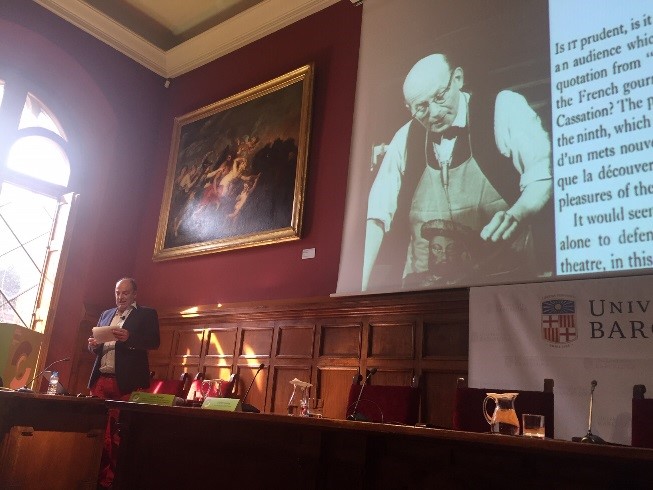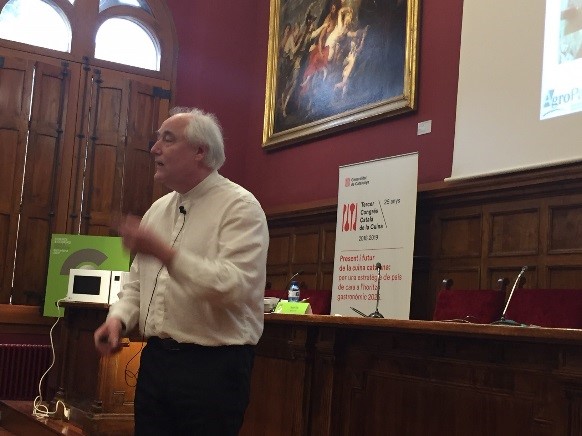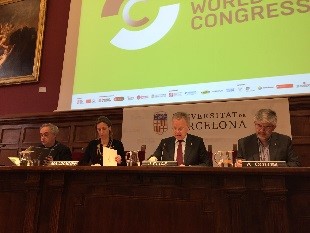Campus News
Science & Cooking Barcelona 2019: Tribute to the physicist Nicholas Kurti (1908‒1998)
On 14 March 1969, Nicholas Kurti (Budapest 1908‒Oxford 1998), a physicist from the University of Oxford’s Clarendon Laboratory, gave a Friday Evening Discourse titled The Physicist in the Kitchen to members of the Royal Society of London. His lecture can be considered the beginning of 50 years of scientists and cooks working together to apply scientific knowledge to culinary practices.
Scientists and chefs paid tribute to Kurti on the first day of the Science & Cooking World Congress Barcelona 2019, which was held in the Aula Magna of the University of Barcelona (UB) from 4 to 6 March as part of the third Catalan Cuisine Congress 2018-2019. A commemorative lecture in his honour was given by Javier Tejada, emeritus professor at the UB’s Faculty of Physics, and Charles Spence, an experimental psychologist and head of the Crossmodal Research Laboratory of the University of Oxford’s Department of Experimental Psychology.
Some of those participating in the Science & Cooking World Congress Barcelona 2019 were fortunate enough to have known Kurti personally or professionally, and most of them have written about landmarks in the development of the science and cooking concept over the last half-century.
In the foreword to La Cuina del Futur, a book written by UB-Bullipedia Unit member Pere Castells and published in Barcelona by Edicions Tibidabo in 2016, the UB’s Torribera Food and Nutrition Campus had already highlighted the significance of Kurti’s lecture and the vital role he played.
An Oxford-based physicist with a great interest in cooking, Kurti grew in prominence thanks to The Physicist in the Kitchen, in which he drew on his experiences with recently developed microwave oven technology and spoke of the importance of scientists investigating the physical and chemical processes occurring in food during cooking. He is often quoted as underlining the lack of such knowledge with the remark “I think it is a sad reflection on our civilization that while we can and do measure the temperature in the atmosphere of Venus we do not know what goes on inside our soufflés”.
In 2000, J. H. Sanders (Clarendon Laboratory) published Kurti’s official biography in the journal Biographical Memoirs of Fellows of the Royal Society. In addition to Kurti’s training in Paris and the writing of his doctoral thesis in Berlin, the biography deals with his scientific activity in Oxford, which began when he joined the Clarendon Laboratory on 16 September 1933, as an expert in low-temperature physics and nuclear magnetization experiments (with Professor Frederick Lindemann, FRS, Lord Cherwell, head of the Clarendon Laboratory).
The biography describes an unusual aspect of Kurti’s academic life, his enthusiasm for cooking. In a section entitled Gastronomy, Sanders examines Kurti’s life to explain where his love of cooking came from, as well as what makes him an initiator of science’s recent incorporation into the culinary arts and a founder of the Molecular and Physical Gastronomy movement.
In 1986, Kurti asked the fellows of the Royal Society for papers, written from a scientific perspective, on any cooking-related topic of their choice. In 1988, he and his wife, Giana, published the book But the Crackling Is Superb. An Anthology on Food and Drink by Fellows and Foreign Members of the Royal Society, with a foreword from the then Royal Society president, Sir George Porter.
In 1992, in conjunction with the Ettore Majorana Foundation and Centre for Scientific Culture in Erice (Italy), Kurti and Hervé This organized the International Workshop on Molecular and Physical Gastronomy, which was subsequently repeated every two or three years in early May. Kurti and This organized four such workshops together, the last of which, on food flavours, took place in 1999 following Kurti’s death. An International Workshop on Molecular Gastronomy, on the subject of food textures, was held in memory of Kurti in 2001. Further workshops took place in 2004 and 2007, followed by a hiatus until 2015.
Professor Charles Spence of the University of Oxford explained Kurti’s key role in the advent of the science and cooking field’s modern era.
S’ha donat a conèixer poc el paper fonamental del tàndem Nicholas Kurti i Hervé This en l’aproximació de la ciència a la cuina. Llegint les memòries de la vida de Nicholas Kurti ens queda la pregunta de quin és el fet va comportar que es materialitzés la relació amb Hervé This. Segons la bibliografia s’indica el punt d’origen de la “Gastronomia Molecular i Física” l’any 1988 en el moment en que This tenia 33 anys i el professor Kurti ja en tenia 80. És l’any de la publicació del llibre “But the crackling is superb...”.
Kurti’s work with This played a crucial yet largely unknown role in bringing science and cooking together. Kurti’s memoirs shed no light on how the partnership began. Based on bibliography, Molecular and Physical Gastronomy appears to have originated in 1988, when This was 33 and Kurti 80. It was the year in which But the crackling is superb... was published.
The first joint publication with This mentioned in Kurti’s biography is dated 1994 and corresponds to two pieces in the Scientific American magazine. This published his doctoral thesis, La Gastronomie Moleculaire et Physique, at Paris 6 University-INRA in 1995, having previously come to the attention of a specialized readership with his book Les Secrets de la Casserole (1993).
As a member of AgroParisTech, This took part in the Science & Cooking World Congress Barcelona 2019. He not only participated in a round table entitled Is a Global General Union of Science and Cooking Possible?, alongside Davide Cassi, Harold McGee, J. Miquel Aguilera, François Chartier, Cesar Vega, Pere Castells and moderator Mariana Koppmann, but also gave a lecture called From Molecular Gastronomy to Note-by-note, which he accompanied with an experimental activity without precedent in the UB’s Aula Magna.
Notably, as long ago as 17 December 2007, at the ceremony in the UB’s Assembly Hall at which Ferran Adrià was awarded an honorary doctorate, the laudatio delivered by Professor Claudi Mans from the Department of Chemical Engineering of the university’s Faculty of Chemistry made reference to Kurti in the following terms:“Any of a number of the UB’s faculties could have proposed this honorary doctorate, as Mr. Adrià’s field, which might initially seem to be part of haute cuisine and gastronomy, is actually linked to many of the university’s academic areas. Simplifying matters intentionally, the aspects of food science and technology, essential in cooking, might correspond to the Faculty of Pharmacy; the nutritional aspects to the Faculty of Medicine or, on a different level, the CESNID; many of the organoleptic aspects, their interrelation and the emotions arising from perceptions to the Faculty of Psychology; the aspects of physical transformations and chemical reactions involved in food preparation to the Faculty of Chemistry, and also the Faculty of Physics; the artistic and aesthetic aspects and those related to the design of prepared food to the Faculty of Fine Arts; the aspects more closely related to the anthropology of food and the interpretation of cooking as a cultural phenomenon to the Faculty of Geography and History; and the economic aspects of the business activity involved to the Faculty of Economics and Business and the School of Business Studies.”
Mans continued as follows: “For science, the field of cooking and, more generically, everything related to food is one with great potential for development, a source of problems to solve and of examples for teaching. Setting aside the earliest contributions, such as Thompson’s 1804 ‘Omelette Surprise’, the present-day movement was started by Nicholas Kurti and Hervé This, along with other scientists and chefs, and theorized and developed at biennial workshops in the Sicilian town of Erice ... giving rise to a movement that has been called ‘Molecular Gastronomy’.”
Presenting the SCIENTIFIC GASTRONOMY BARCELONA 2019 manifesto was the greatest tribute the Science & Cooking World Congress Barcelona 2019 event’s organizers and speakers could have paid Kurti.
This article is dedicated to the Kurti family, especially to Nicholas Kurti’s daughter Susannah, as well as to the memory of his second daughter, Camilla, who died of cancer at the age of 66 just a few months ago (July 2018).
To know more:
- Laudatio by Claudi Mans in the awarding of Doctor Honoris Causa to Ferran Adrià.
- Congress Program “Science & Cooking
- III Congrés Català de la Cuina 2018-2019.
- Manifest "Scientific gastronomy Barcelona 2019"
Photo gallery:
Torribera Campus
Contact Details
- Food and Nutrition Torribera Campus
Prat de la Riba, 171 - 08921 Santa Coloma de Gramenet
Tel.: 934 031 980 - Fax: 934 031 952
- campusalimentacio
torribera@ub.edu - How to find us










